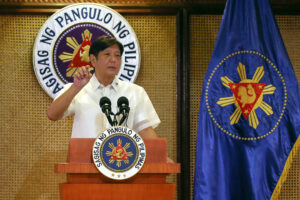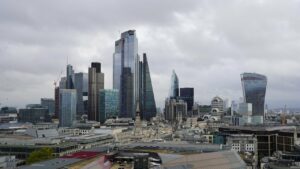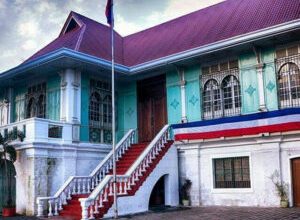Business groups want Marcos’ SONA to show clear roadmap for next 6 years

By Revin Mikhael D. Ochave and Kyle Aristophere T. Atienza, Reporters
PHILIPPINE President Ferdinand R. Marcos, Jr. is expected to provide more details about his administration’s priorities as he delivers his first State of the Nation Address (SONA) before Congress on Monday (July 25).
Business groups and analysts want Mr. Marcos, who clinched a landslide victory, to provide a clear roadmap for his six-year term as the economy faces rising inflation, ballooning government debt and a darkening global outlook.
George T. Barcelon, president of the Philippine Chamber of Commerce and Industry, hopes Mr. Marcos will provide more support for pandemic-hit businesses and assure them of good governance under his administration.
“We want to hear from him that the government is ready and able to help us,” he said by telephone.
Mr. Barcelon said Mr. Marcos needs to outrightly reject cronyism or the practice of rewarding friends and allies in his first SONA.
“We hope President Marcos sends more signals that business is welcome again as a partner, that laws, franchises, and contracts will be upheld and targeting businesses politically be stopped,” Makati Business Club (MBC) Executive Director Francisco “Coco” Alcuaz, Jr. said in a Viber message, adding that this would boost interest in much-needed public-private partnership (PPP) projects.
He said they are also hoping Mr. Marcos will declare an education and nutrition crisis in the country.
“A world-beating, two-year no-classroom lockdown didn’t help, plus one-third of 5-year-old kids are malnourished, hurting their ability to learn for life. If we don’t fix these twin crises, we will chug along, at best. No economic policy will make us a high-income country without a smart and skilled workforce to execute it,” Mr. Alcuaz said.
Semiconductor and Electronics Industries in the Philippines Foundation, Inc. (SEIPI) President Danilo C. Lachica said via mobile phone message they want Mr. Marcos to review the rationalization of fiscal incentives under Republic Act No. 11534 or the Corporate Recovery and Tax Incentives for Enterprises (CREATE) Act.
“Top on our list is the review of CREATE’s incentives rationalization. It has not been effective in attracting investments versus our ASEAN neighbors,” he said.
Mr. Lachica said the President should also elaborate on his plans to reduce the cost of doing business, particularly for power, labor and logistics, in the Philippines.
“We want hear his plans on strictly implementing (ease of doing business) to eliminate corruption, removing bureaucracy, red tape, and transparency,” he added.
EXIT FROM PANDEMICPhilippine Retailers Association (PRA) President Rosemarie B. Ong told BusinessWorld via mobile phone that they want to hear about Mr. Marcos’ economic programs, as well as the plan to exit from the coronavirus disease 2019 (COVID-19) pandemic.
“In particular (we want to hear) the prioritization of the proposed online taxation, which is important for retailers as it aims to level the playing field for online and offline retailers,” she said.
Steven T. Cua, Philippine Amalgamated Supermarkets Association, Inc. president, said in a mobile phone message that he wants Mr. Marcos to provide a roadmap or development plans for different industries over the next decade.
“We also wish to hear on the development of employment-generating backyard industries that produce raw materials for commercial and industrial customer, which promotes entrepreneurship and helps diminish reliance on importation as well as unemployment. We also want to hear effective solutions versus smuggling,” he added.
Ferdinand I. Raquelsantos, Electric Vehicle Association of the Philippines chairman emeritus, said in a Viber message the electric vehicle (EV) industry is hoping to see more support from the Marcos administration.
“We need government support in terms of subsidies, for the manufacturing, sales, promotions and use of EVs. An example is giving rebates if you buy EVs, and a loan subsidy if jeepney operators buy EVs and replace their dilapidating jeepneys,” Mr. Raquelsantos said.
Chris Nelson, British Chamber of Commerce Philippines (BCCP) executive director, said they want to hear Mr. Marcos express support for the Regional Comprehensive Economic Partnership (RCEP) trade deal.
“(The ratification of RCEP would) send a clear signal to investors. This would be a very good time now because Congress will resume (session),” Mr. Nelson said in a mobile phone interview.
The Philippines has yet to ratify its membership in RCEP, a multilateral trade agreement involving Australia, China, Japan, South Korea, New Zealand and the 10 members of the Association of Southeast Asian Nations (ASEAN).
Mr. Nelson said the BCCP also wants Mr. Marcos to provide details on what he plans to do to further open up the economy to foreign investments.
CLEAR PLANSDuring the campaign period, Mr. Marcos promised cheaper food, more jobs, more roads and better public facilities, and urged overseas workers to return to the country.
But in making such promises, he needs to inform Filipinos about the country’s fiscal status and engage them on how he would handle public finances in the next six years, Zyza Nadine M. Suzara, an economist and public finance analyst, said.
“He should squarely talk about his plans to shore up financing for government services not only for the rest of 2022, but also for 2023 and beyond. He would need to talk about specific courses of action, such as whether taxes would increase, or if more debt would be incurred,” she said via Messenger.
The Philippine economy is expected to grow by 6.5-7.5% this year. The National Government’s budget deficit stood at P458.7 billion as of end-May, narrower by 19% from the same period a year ago.
Outstanding debt stood at P12.5 trillion at the end of May, as the Duterte administration ramped up borrowings to finance its pandemic response.
As of the first quarter of 2022, the Philippines’ debt-to-GDP ratio stood at 63.5%, the highest since 65.7% in 2005. This surpassed the 60% threshold considered as manageable by multilateral lenders for developing economies.
“The bigger debt in itself is not a serious problem. But the President must show credible commitment that we can sustain our capacity to pay,” Filomeno Sta. Ana, coordinator of Action for Economic Reforms, said in a Messenger chat.
Mr. Sta. Ana also said he expects the President to push for “smart taxes” that have popular support and that could generate significant revenues, such as the proposed excise duties on vape products, cigarettes, and alcohol.
At the same time, Mr. Marcos needs to assure the business sector that he would address rising inflation and the peso’s depreciation against the US dollar, Benvenuto N. Icamina, vice-president and chief operating officer at The Wallace Business Forum, said.
Inflation rose to a nearly four-year high of 6.1% in June, bringing average inflation to 4.4% so far this year. The peso earlier this month dropped to its weakest level in nearly 17 years.
The Bangko Sentral ng Pilipinas earlier this month raised its key policy rates by 75 basis points in an off-cycle move as it sought to contain broadening price pressures and rescue the peso.
Higher interest rates could affect private contractors in government projects, said Terry L. Ridon, convenor of InfraWatchPH.
“This is a hard cap on infrastructure firms on undertaking more projects or capital expansion, as previous profit projections based on old interest rates may not be the same anymore,” he said in a Messenger chat. “The rate hike will compel them to look for other sources of funding.”
INFRASTRUCTUREMr. Marcos may use the SONA to unveil the blueprint for his infrastructure plan.
“Expect the President to focus on a new ‘Build, Build, Build’ plan as a way to project that the government is output-driven,” Arjan P. Aguirre, who teaches political science at the Ateneo de Manila University, said in a Messenger chat.
Bernardo M. Villegas, an economist at the University of Asia and the Pacific, said the government should focus the “Build, Build, Build” program “on farm- to-market roads, irrigation systems and other infrastructures that will help the small farmers improve their productivity and incomes.
Mr. Villegas said the country could easily achieve infrastructure resilience once the “pre-requisites of agricultural development and food security are achieved.”
Terry L. Ridon, convenor of InfraWatchPH, said Mr. Marcos’ infrastructure talk will “ring hollow without considering the current limitations in our fiscal space and general economic situation.”
“We are expecting typically general statements rather than concrete plans, with a focus on feel-good promises of delivering on its commitment to an infrastructure-focused agenda,” he said.
Mr. Ridon said Mr. Marcos should also assure the public that his projects would not favor only a few countries, including China. “The Marcos government should not fall under this trap.”
Also the President might fall short of discussing much-needed good governance and political reforms, said Mr. Aguirre.
“He will not be mentioning anything related to human rights, previous corruption scandals, and political repression cases,” he added.




